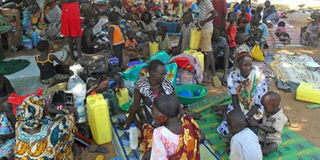How does Day of African Child make sense for children in refugee situations?

Refugee camp
What you need to know:
- Accelerating protection, empowerment and equal opportunities for children, may still be a hoax as long as there are still wars in Africa.
- Children in a refugee situation cannot enjoy equal opportunities let alone protection and meaningful empowerment like those living in relatively peaceful environments.
Day of African Child is a day for all those who care to reflect on children in their various situations. The theme of this year’s celebrations is: ‘Accelerating protection, empowerment and equal opportunities for children in Africa by 2030”.
This, according to me, should have come yesterday since Africa has had a lot of conflicts and still has, where children have been involved and gone through untold suffering.
I would, therefore, like to put a spotlight on some of the issues that stand out in expression of abuses children have gone through and still suffer.
Children have been lured from their own families in the guise of being taken to school, but have instead ended up in jungles where they are indoctrinated to be killer machines, made to recite messages of hate, radicalised to be killers rather than lovers and preservers of life.
The perpetrators of these conflicts often apply the principle of “the end justifies the means”, meaning they do not care what means they use to achieve their agenda even if it means annihilation of an entire community.
Children in refugee camps go through a lot of injustices that range from child or forced marriages, sexual abuse, trauma, deprivation in terms of education and other social services including health.
In such situations also prevails moral decadence where survival for the fittest is paramount. Underage girls are often taken advantage of by ill-intentioned men, who prey on such disadvantaged population. And because the population therein is living in dire need and despair, it is easier for such vices to thrive and continue unabated.
However, this becomes even more complicated if there are no systems in place to address such gambits. The children experience multiple losses, some beyond imaginable limits while conflicts are still ongoing in Africa.
Some conflicts in the continent have lasted nearly 50 years and one can imagine the products of such a war where some communities have totally been wiped out, with others missing some generations! Such products of war will not value life because all they have seen and known is aggression, hate and revenge, which are not good indicators for development even as, for instance Uganda, we look at Vision 2030.
Governments should also come up with robust programmes to address the needs of people living in refugee camps of which children are the most affected and vulnerable. Such services include counselling aimed at dealing with the psychological aspect. This is because children experience trauma due to what they have seen and gone through, including lost identity as a result of separation.
Education and health services should be a must because the ultimate goal here is to preserve life and make meaning out of it. Africa must unite against conflicts and address the root causes, which usually revolve around inequalities, marginalisation and exclusion stemming from identity-based discrimination. Otherwise, the continent faces the risk of hatching a more dangerous and rancorous generation in years to come.
Therefore, accelerating protection, empowerment and equal opportunities for children, may still be a hoax as long as there are still wars in Africa.
Children in a refugee situation cannot enjoy equal opportunities let alone protection and meaningful empowerment like those living in relatively peaceful environments.
Ms Amongin is a child protection officer at Child Restoration Outreach, Mbale.
[email protected]


